Tuesday Feb 17, 2026
Tuesday Feb 17, 2026
Thursday, 11 January 2024 00:23 - - {{hitsCtrl.values.hits}}
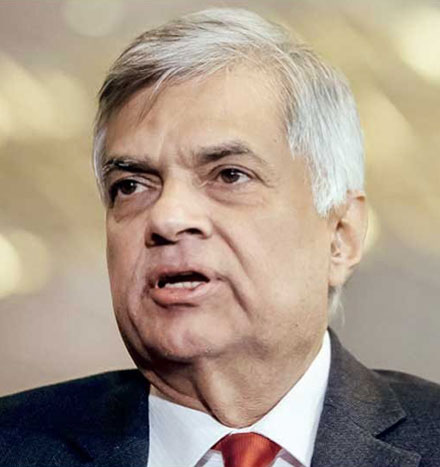
Fighting Houthis, never Tigers
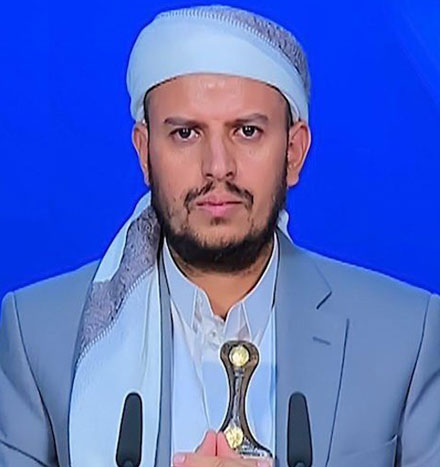
Yemen’s Houthi leader
“…these guys have absolutely no idea how to run a country.”
– Dr. Harsha de Silva on the NPP –
 Sri Lanka is known for its resilience and rapid comebacks, with wars and a tsunami as evidence. This time, not so much. One of the main reasons that Sri Lanka’s economic recovery is making such heavy weather is that the system is not functioning. The system isn’t functioning because large parts of the framework have been broken and are rusted. Therefore, the entire system is unbalanced, lopsided, bearing far too much weight—of economic contraction and collapsing living standards—on far too narrow a base of public consent.
Sri Lanka is known for its resilience and rapid comebacks, with wars and a tsunami as evidence. This time, not so much. One of the main reasons that Sri Lanka’s economic recovery is making such heavy weather is that the system is not functioning. The system isn’t functioning because large parts of the framework have been broken and are rusted. Therefore, the entire system is unbalanced, lopsided, bearing far too much weight—of economic contraction and collapsing living standards—on far too narrow a base of public consent.
There are no functioning municipal authorities and Pradeshiya Sabhas at the grassroots. There are no functioning Provincial Councils. The Parliamentary majority doesn’t have a mandate for the policy direction it is headed in while it has a contrary mandate obtained in 2019-2020, against such policies. The President wasn’t elected by the people either at the national level or the parliamentary level.
All this means the motors of development and structures of delivery are non-functional, the wiring is ripped out or tangled, the feedback loops and safety valves blocked. The executive, the bureaucracy, the Police and the military do function, but that is rather like a human being reduced to its bare skeleton.
The asymmetries created by accelerated economic shock therapy and an unprecedented shift in the socioeconomic tectonic plates have caused 2024 to be perched precariously “atop a volcano” as our sister paper alerted in an editorial comment.
Avoiding a volcanic explosion is contingent on the whole framework being restored and the system reactivated. Its balance can return only with renewed public consent obtainable solely through elections at all levels.
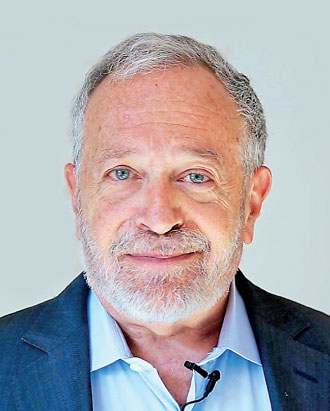 |
| Emeritus Prof. Robert Reich |
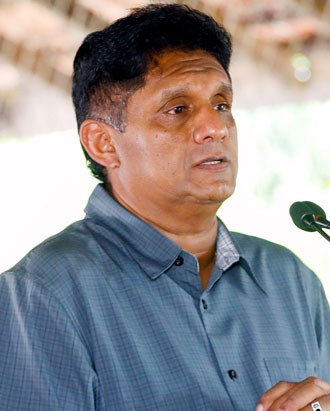 |
| Running on the blueprint or not? |
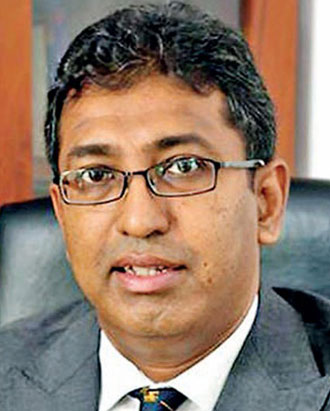 |
| Economic Ranilism without Ranil |
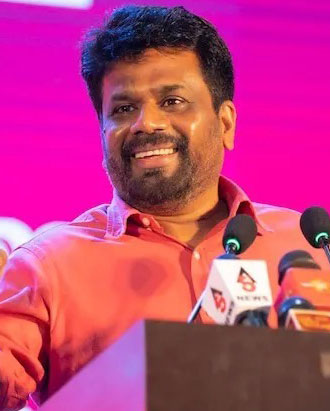 |
| “These guys” or countervailing power? |
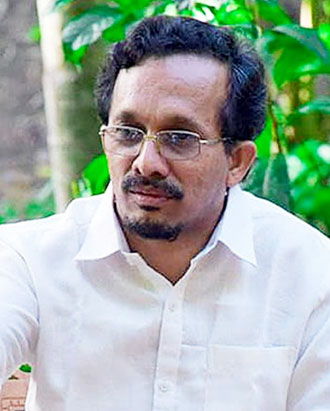 |
| Harsha’s target Handunetti
|
David Cameron’s poodle
As Prime Minister, Ranil Wickremesinghe never fought the LTTE, and literally saved Prabhakaran’s life-- thereby prolonging the war by 8 terrible years--by calling-off a Sri Lankan Special Forces LRRP operation targeting him on 21 December 2001, overriding the entreaties of Army Commander Gen. Lionel Balagalle who argued that a negotiated peace would be far likelier without Prabhakaran. Senior instructor at Sandhurst, Prof. Paul Moorcraft exposed Ranil’s treachery in his book on the defeat of the Tigers.
That betrayal cost us Sri Lanka’s finest foreign minister four years later, during the CFA. The same Ranil Wickremesinghe, who didn’t want to eliminate Prabhakaran who murdered the grandson of Nehru and the (UNP) President who would have made Sri Lanka a Malaysia, now wants to put the Sri Lankan military in harm’s way, fighting the Houthis in the Red Sea.
Most countries have ignored the US-UK call. The Houthis are not on a rampage against shipping in general. They are demonstrating solidarity with the Palestinians of Gaza. We may deplore their modes and methods of doing so, but it is not our fight. We don’t even belong in that area of the world and we are decidedly not a global power.
By inserting Sri Lanka into this fight, we are taking the side of the West in an active, military sense. This comes together with Minister Manusha Nanayakkara negotiating with Israel to supply 20,000 workers to replace the Palestinians who have been banned from working in Israel, in what once were Palestinian lands. Ranil’s administration is betraying our moral code (we boycotted apartheid South Africa and banned SL cricketers who played against it), losing us longstanding friends and painting a target on our back.
Arab states refusing to join this naval force include Saudi Arabia which until fairly recently was waging a no-holds barred war against the Houthis in Yemen but has since been engaged in peace negotiations. Emotions are so strong in the Arab world about Israel’s genocidal war that the Saudis have refused to participate, but Sri Lanka which has no fight with Yemen or the Houthis and has every interest –sources of oil, markets for tea and votes at the UN in Geneva—in maintaining our traditional friendship with the Arab and Islamic world, is doing the contrary and signing up with the US-UK.
Nonalignment means, at its core, not entering global or regional rivalries by joining military alliances or enterprises of one or the other superpower. Sri Lanka is being misled by Ranil Wickremesinghe—who has no popular mandate to do anything of the sort—into crassly violating that basic tenet.
Harsha vs “These guys”
Recently, the main Opposition party’s chief economist and the primary author of its Economic Blueprint, Dr. Harsha de Silva, heaped scorn in an X on JVP-NPP frontliner and former chairperson of COPE, Sunil Handunetti, and Prof Anil Jayantha of Sri Jayewardenepura university. Taking out of context a flippant colloquialism from Handunetti carelessly tossed on an FM radio talk-show, Harsha ignored the substance of his argument on ISBs while jeering from a self-placed pedestal. Handunetti has not retaliated so far with a reminder of the ‘footnote fetishists’ who tried to airbrush the Central Bank bond scam, but AKD has cuffed Harsha around on public platforms.
The NPP duo’s substantive point on ISBs echoed a statement last year by a galaxy of economists:
 “Private creditors own almost 40% of Sri Lanka’s external debt stock, mostly in the form of International Sovereign Bonds, but higher interest rates mean that they receive over 50% of external debt payments. Such lenders charged a premium to lend to Sri Lanka to cover their risks, which accrued them massive profits and contributed to Sri Lanka’s first ever default in April 2022. Lenders who benefited from higher returns because of the “risk premium” must be willing to take the consequences of that risk.”
“Private creditors own almost 40% of Sri Lanka’s external debt stock, mostly in the form of International Sovereign Bonds, but higher interest rates mean that they receive over 50% of external debt payments. Such lenders charged a premium to lend to Sri Lanka to cover their risks, which accrued them massive profits and contributed to Sri Lanka’s first ever default in April 2022. Lenders who benefited from higher returns because of the “risk premium” must be willing to take the consequences of that risk.”
(https://debtjustice.org.uk/wp-content/uploads/2023/01/Sri-Lanka-debt-statement.pdf)
The signatories to the statement contain the names of internationally renowned economists, several dozen professors and at least one UN Special Rapporteur (also a professor).
 “182 economists and development experts have called for debt cancellation for Sri Lanka to help it out of its current economic crisis. In a statement released today, the signatories – including Jayati Ghosh, Thomas Piketty, Dani Rodrik, Ravi Kanbur, Yannis Varoufakis and Ha-Joon Chang – call for debt cancellation by all external creditors and measures to stem the illicit outflow of capital from the country. The experts say that private companies who lent at high interest rates to corrupt politicians must face consequences from their risky lending by cancelling debt.”
“182 economists and development experts have called for debt cancellation for Sri Lanka to help it out of its current economic crisis. In a statement released today, the signatories – including Jayati Ghosh, Thomas Piketty, Dani Rodrik, Ravi Kanbur, Yannis Varoufakis and Ha-Joon Chang – call for debt cancellation by all external creditors and measures to stem the illicit outflow of capital from the country. The experts say that private companies who lent at high interest rates to corrupt politicians must face consequences from their risky lending by cancelling debt.”
(https://debtjustice.org.uk/press-release/ghosh-piketty-and-varoufakis-among-182-experts-calling-for-sri-lanka-debt-cancellation)
Instead of answering the substantive point Harsha scornfully says of the NPP-JVP that “these guys have absolutely no idea how to run a country”. Coming from a guy who was on Ranil’s team which ran up a mountain of private debt –ISBs--which will confront us mid-2024, that’s ironic.
What makes it doubly ironic is that after Anura Dissanayake was Minister of Agriculture for 8 months in a Provisional Government under CBK, he kept getting re-elected by the people, whereas Harsha’s hero and guru Ranil Wickremesinghe lost every election he faced following a stint as PM. There was a 15-year gap between ‘Regaining Sri Lanka’ and Yahapalanaya, and after his last election as PM in 2015, he was turfed-out at the next from his homebase of Colombo. He was never once elected to lead the country. The UNP shrank from the island’s largest single party to a mere 23% (Feb 2018) and then near-zero. It is clear from Ranil’s and the UNP’s electoral fate that the sentiment “these guys have absolutely no idea to run a country” was exactly what the citizenry thought of Harsha’s former boss, guru, and team.
Goebbelsian economics
Like a Matryoshka doll, there is a smaller economic lie hidden inside a big one. The smaller lie is that the matter of tax policy is intractable, a Catch-22: Mangala imposed taxes under Yahapalanaya, and lost; Gotabaya picked up on the discontent by drastic tax cuts and was thrown out because of revenue loss triggering the economic crisis; therefore, Ranil’s tax policy, agreed upon with the IMF is the only solution, though it may require some tweaking as suggested by the SJB ‘team’. That framing omits a principle that Sri Lankans if no one else should be familiar with and followers of: the Middle Path. Where’s the logic in heavy taxes on the working classes, the middle classes, the professionals and retirees? Where’s the fair-play in a proportionately light taxation of the top corporates—many of which benefit from tax exemptions—and the superrich? ‘Proportionality’ is a principle of the international laws of war, so why not of taxation? The tax structure should be far more proportionate, or ‘progressive’ as the term goes, with a steep gradient for the uber-rich and companies making super-profits.
The dominant economic ideology in Sri Lanka today is the ideology of the economic elite which has hydra-headed political representation: unelected President Wickremesinghe, the residual UNP, the SLPP Cabinet and the SJB Economic Council. Their economic doctrine accords primarily with the interests and actively expresses the perspective of the 1% (which gets 31% of national wealth), not the 90% (whose expenditure has increased) or the 60% (whose incomes have declined) or the 50% (who get only 4% of the national wealth).
An academic on vacation in Sri Lanka turning on the TV in his/her hotel room, couldn’t tell the difference in the content of an economic presentation by Ranil Wickremesinghe, Kanchana Wijesekara, Shehan Semasinghe, Harsha de Silva and Eran Wickremaratne. They belong politically to different parties but economically to the same party.
The “private sector/free market” is the engine of the Ranil-Harsha economic model which derives from two undistinguished thinkers they cite: BR Shenoy and Ricardo Hausmann. Their “free-market” fundamentalism is widely discredited in enlightened mainstream Western economic thought and policy discourse.
Read Robert Reich
Prof. Robert Reich has incomparably more stellar credentials than Ranil’s and Harsha’s guru Ricardo Hausmann. Chancellor’s Professor of Public Policy (now Emeritus) at Berkeley, he served in the administrations of Presidents Gerald Ford, Jimmy Carter and Bill Clinton. He was Secretary of Labour in Bill Clinton’s Cabinet before returning to academia.
Prof Reich pulverises and disintegrates the foundation stones of the economic doctrine that the Ranil-Harsha economic policy model is based upon. He then replaces them with new concepts as foundation stones of a new model.
The first is the myth of the ‘free market’ vs. ‘governmental intrusion’.
 ‘Few ideas have more profoundly poisoned the minds of more people than the notion of a ‘free market” existing somewhere in the universe, into which the government “intrudes”…But the prevailing view, as well as the debate it has spawned, is utterly false…
‘Few ideas have more profoundly poisoned the minds of more people than the notion of a ‘free market” existing somewhere in the universe, into which the government “intrudes”…But the prevailing view, as well as the debate it has spawned, is utterly false…
…As the economic historian Karl Polanyi recognized, those who argue for “less government” are really arguing for a different government—often one that favours them or their patrons.
…The “free market” is a myth that prevents us from examining these rule changes and asking whom they serve. The myth is therefore highly useful to those who do not wish such an examination to be undertaken. It is no accident that those with disproportionate influence over these rules, who are the largest beneficiaries of how the rules are designed and adapted, are also the most vehement supporters of the “free market” and the most ardent advocates of the relative superiority of market over government.’ (Reich, ‘Saving Capitalism’, UK 2016, pp. 4-7)
The biggest of Economic Big Lies is that there is no solution other than the one contained in the Ranil-IMF deal, bookended by Ranil’s Regaining Sri Lanka (2002) and Harsha’s Blueprint (2022). This is accompanied by a chorus: “What is the alternative? Where is the alternative? Who is the alternative? Who has an alternative?”
This narrows the psychological parameters of the citizens’ electoral choice to which side has the best team to continue implementing Economic Ranilism. Is it the SJB featuring free-market rappers Harsha & Eran?
Prof. Robert Reich lays the foundation of an alternative economic perspective, strategy and model:
 “My solution—and I’m hardly alone in suggesting this—has been an activist government that raises taxes on the wealthy, invests the proceeds in excellent schools and other means people need to get ahead, and redistributes to the needy. These recommendations have been vigorously opposed by those who believe the economy will function better for everyone if government is smaller and if taxes and redistributions are curtailed.” (Ibid, Introduction xvii)
“My solution—and I’m hardly alone in suggesting this—has been an activist government that raises taxes on the wealthy, invests the proceeds in excellent schools and other means people need to get ahead, and redistributes to the needy. These recommendations have been vigorously opposed by those who believe the economy will function better for everyone if government is smaller and if taxes and redistributions are curtailed.” (Ibid, Introduction xvii)
Reich’s book has been applauded by two Nobel Prize winners for economics, Joseph Stiglitz (“an important book…a riveting guide”) and Paul Krugman (“a very good case”). It is not Marxist, communist, socialist or even social democratic. Its very title blares out its intention: Saving Capitalism. The book’s subtitle or ‘strap’ gives the secret formula of how capitalism is to be saved; in which direction it must pivot or be pivoted to be saved; and what model of capitalism should and can be saved: “For the Many, Not the Few”.
Countervailing power
Robert Reich has a third cornerstone. He identifies the key variable which can swing national policy—and capitalism-- in favour of “the many” rather than “the few”. That decisive factor is defined by him as “countervailing power” (Ibid., Introduction). Consequences for the economy, society and public interest are positive when it is strong; negative when it is weak.
Had Sajith based himself on the Ranasinghe Premadasa model and the equity-driven policy that Joseph Stiglitz recommended to the Yahapalanaya UNP on his visit in 2015, he and the SJB would have been, like his father always was, the “countervailing power” on the part of the people against the hegemonic power of the elite.
The SJB has abdicated the role of “countervailing power”. It is a countervailing power only against the Rajapaksas, none of whom are running for president.
Ranil and Harsha are for radical privatization and foreignization, and liberalization of labour and land reform laws. Both oppose price controls and indicative planning. Harsha’s Economic Blueprint is the centerpiece of series of SJB public events in this Presidential election year, starting in Matara, January 13th.
Robert Reich nails “these guys”, the free-market fundamentalists:
 “Many of the most vocal proponents of the “free market”—including executives of large corporations and their ubiquitous lawyers and lobbyists, denizens of Wall Street and their political lackeys, and numerous multimillionaires and billionaires…” (Ibid, Introduction xvii)
“Many of the most vocal proponents of the “free market”—including executives of large corporations and their ubiquitous lawyers and lobbyists, denizens of Wall Street and their political lackeys, and numerous multimillionaires and billionaires…” (Ibid, Introduction xvii)
Reich explains that “countervailing power” is needed to drive policy correctives which tip the balance within, not against capitalism “for the many, not the few”. Due to the SJB’s rightward policy pivot and resultant social abdication, AKD’s NPP-JVP is the main “countervailing power”.
At the Galle NPP Women’s Convention Anura said that unlike other political parties, the NPP-JVP understood the economic crisis not only as statistics but as lived reality. He listed the unprecedented burdens and hardships that women were coping with in their everyday lives and passionately questioned “is this a life? What kind of life is this?”. He pledged to change that dismal reality and urged the women to mobilise to make that change possible, starting with the upcoming election.
Genially breezing through FACETS or winning hearts and minds of women in Matara and Galle, you sense the Force is with him. (https://youtu.be/yMwM_MBKO8Y).